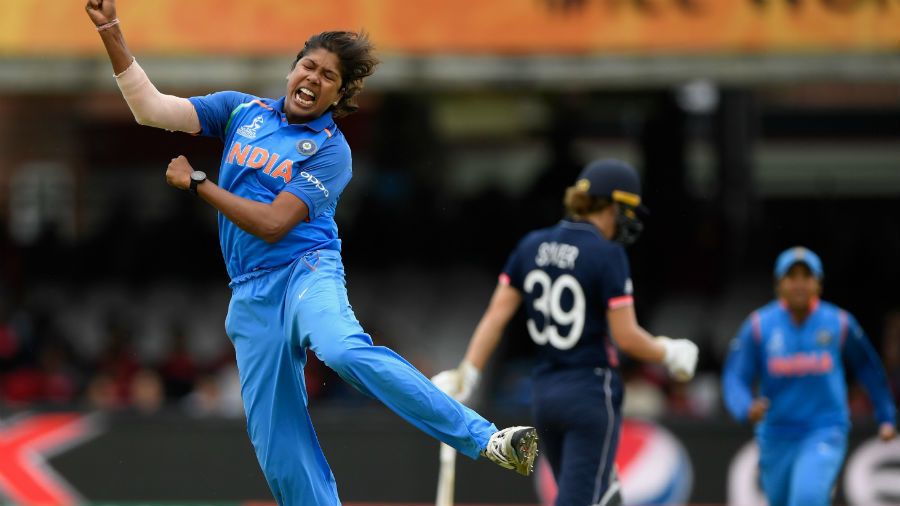“It may have played a part in how we performed. It was like a final barrier we were stumbling at every time. Maybe this year we will be able to respond better as a team. Sports is very unpredictable, but hopefully, those near-misses and our preparations leading up to this World Cup will help us react better in big matches.”
With record crowds in attendance on both occasions, critics, fans, and casual followers deemed India’s defeats less a reflection of technical ineptitude and more of fragility of nerves.
“I think people can criticise us. But it’s something we are [still] developing slowly, slowly. Overnight it will not happen, but we are in the process of developing,” Goswami said. “So, whatever experience we’ve gathered in the past – I’ll put it in that way – hopefully, in this tournament we’ll handle in a better way.
“I can expect that [kind of approach) from my team-mates. They are mentally very strong. Whenever challenging stuff come, they take that challenge and take responsibility. So, I am very much hopeful that learning experience is going to help us in this tournament.”
Instead, the focus, she said, should be on implementing the takeaways from India’s series defeats in 2021 against South Africa (at home) and England and Australia (away).
“World Cups come with pressure, expectations, and unpredictable elements – it’s sport, after all,” said Goswami. “But I expect, individually and as a unit, I and we, back ourselves to deal with that pressure in a positive way without thinking too much about anything. We must enjoy our cricket because I think that’s very important if we are to express ourselves and our preparedness in a proper manner.
“We have been put under very challenging situations [in the recent past]. Though we did not win any of the three series we played last year, they were all very important preparations for us. So, having been through a variety of difficult match situations, and close defeats, hopefully, will react better under pressure at this World Cup.”
India have been in quarantine since January 16 in Mumbai and are due to depart for New Zealand on January 24. They are expected to serve at least a seven-day hard quarantine upon the entering the country, with a very real possibility of being under rigid restrictions, albeit with some relaxations, for much longer.
As a veteran of over 370 international matches, Goswami, who made her India debut in January 2002, said it’s important for cricket and its stakeholders to not lose perspective of the circumstances of the sport in the pandemic era and the challenges facing athletes’ mental health.
“This (mental barrier) is not something you can overcome in a day,” Goswami said. “It’s not a cricketing technical part that individually can go there and bat and bowl [to improve]. It’s a different thing. It’s not easy.
“I think worldwide we all are struggling with mental-health issues at this moment. Because of the present situation, sportspersons are having to quarantine, they’re staying in biobubbles, not able to meet your family, friends, staying in hotels, having same food – that’s a challenge. That’s called mental toughness.”
Heading into the World Cup, the Indian squad, Goswami believes, have grown into a more tight-knit group. She attributes that mainly to the players’ participation in a boot camp, understood to be the brain child of head coach Ramesh Powar, during Christmas last year in the cool climes of Dehradun, located in the northern Indian state of Uttarakhand.
“In my 20 years as an India cricketer, never before had I participated in anything officially known as a boot camp” Goswami said, smiling. “Yes, we may have gone on camps from the National Cricket Academy (NCA) for a night or so in the past, but this camp – the boot camp – lasted five days, so it was definitely first of its kind.
“It was a new and fun experience, especially getting to know each other better, from up close, as team-mates – was refreshing and could be helpful for us in the future. I now know my team-mates a little better than I did before the boot camp because we were put through a kind of challenging situation – living in a tent, in cold weather, with limited resources, and yet no body complained.
“Plus, there were tasks devised to help with team bonding and react in pressure situations. I hope this experience helps us in the World Cup because understanding each other as team-mates plays a big role in a team’s performance. We never had this kind of a team bonding exercise or camp, so I’d saw it was a good thing to participate in before New Zealand tour and the World Cup.”
Annesha Ghosh is a sub-editor at ESPNcricinfo. @ghosh_annesha
